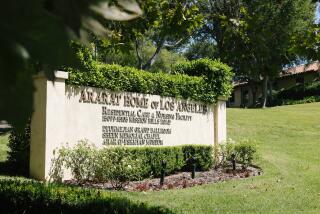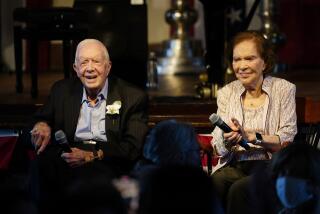For nursing home residents with breast cancer, surgery actually may hasten death
Surgery is a mainstay of breast cancer treatment, offering most women a good chance of cure.
For frail nursing home residents, however, breast cancer surgery can harm their health and even hasten death, according to a study published this week in JAMA Surgery.
The results have led some experts to question why patients who are fragile and advanced in years are screened for breast cancer, let alone given aggressive treatment.
The study examined the records of nearly 6,000 nursing home residents who had inpatient breast cancer surgery the past decade. It found that 31% to 42% died within a year of the procedure. That’s significantly higher than the 25% of nursing home residents who die in a typical year, said Dr. Victoria Tang, lead author and an assistant professor of geriatrics and hospital medicine at UC San Francisco.
Although her study doesn’t include information about the cause of death, Tang said she suspects that many of the women died of underlying health problems or complications related to surgery, which can further weaken older patients. Patients who were the least able to take care of themselves before surgery, for example, were the most likely to die within the following year. Dementia also increased the risk of death.
It’s unlikely that many of the deaths were due to breast cancer, which often grows slowly in the elderly, Tang said. Breast cancers often take a decade to turn fatal.
“When someone gets breast cancer in a nursing home, it’s very unlikely to kill them,” said study co-author Dr. Laura Esserman, director of the UCSF breast cancer center. “They are more likely to die from their underlying condition.”
Yet most patients in the study got sicker and less independent in the year following breast surgery.
Among patients who survived at least one year, 58% suffered a serious downturn in their ability to perform “activities of daily living,” such as dressing, bathing, eating, using the bathroom or walking across the room.
Women in the study, who were on average 82 years old, were coping with a variety of life-threatening health problems even before being diagnosed with breast cancer. About 57% suffered from cognitive decline, 36% had diabetes, 22% had heart failure, 17% had chronic lung disease, and 12% had survived a heart attack.
The high mortality rate in the study is striking because breast surgery is typically considered a low-risk procedure, said Dr. Deborah Korenstein, chief of general internal medicine at New York’s Memorial Sloan Kettering Cancer Center, who wasn’t involved in the study.
Surgery late in life is hardly uncommon. One-third of Medicare patients undergo surgery in the year before they die, according to a 2011 study in the Lancet, and 18% of Medicare patients have surgery in their final month of life and 8% in their final week.
Nearly 1 in 5 women with severe cognitive impairment, such as Alzheimer’s disease, get regular mammograms, according to a study in the American Journal of Public Health.
The new study leaves some important questions unanswered.
For instance, it didn’t include healthier nursing home residents who are strong enough to undergo outpatient surgery, said Dr. Heather Neuman, a surgeon and associate professor at the University of Wisconsin School of Medicine and Public Health who wasn’t involved in the research. These women may fare better than those who are very ill.
The Medicare database used in this study didn’t mention whether any of the patients had chemotherapy, radiation or other outpatient care, so it’s possible that some of the women suffered complications due to these other therapies, not from surgery, the study authors said. However, they noted, only 6% of nursing home residents with cancer are treated with chemotherapy or radiation.
The new study raises questions about the value of screening nursing home residents for breast cancer, Korenstein said. Although the American Cancer Society hasn’t set an upper age limit for breast cancer screening, it advises women to be screened as long as they’re in good health and expected to live at least another decade. That rules out most nursing home residents, she said.
“It makes no sense to screen people in nursing homes,” Korenstein said. “The harms of doing anything about what you find are far going to outweigh the benefits.”
Esserman and Tang said their findings suggest doctors need to treat breast cancer differently in very frail patients. Perhaps doctors should give very frail patients the option of undergoing less aggressive therapy, such as hormonal treatments. In other cases, doctors could offer to simply treat symptoms as they appear.
“People think, ‘Oh, a lumpectomy is nothing,’ ” Esserman said. “But it’s not nothing in someone who is old and frail.”
Szabo is a senior correspondent for Kaiser Health News, an editorially independent publication of the Kaiser Family Foundation. KHN’s coverage of these topics is supported by the John A. Hartford Foundation and the Gordon and Betty Moore Foundation.






